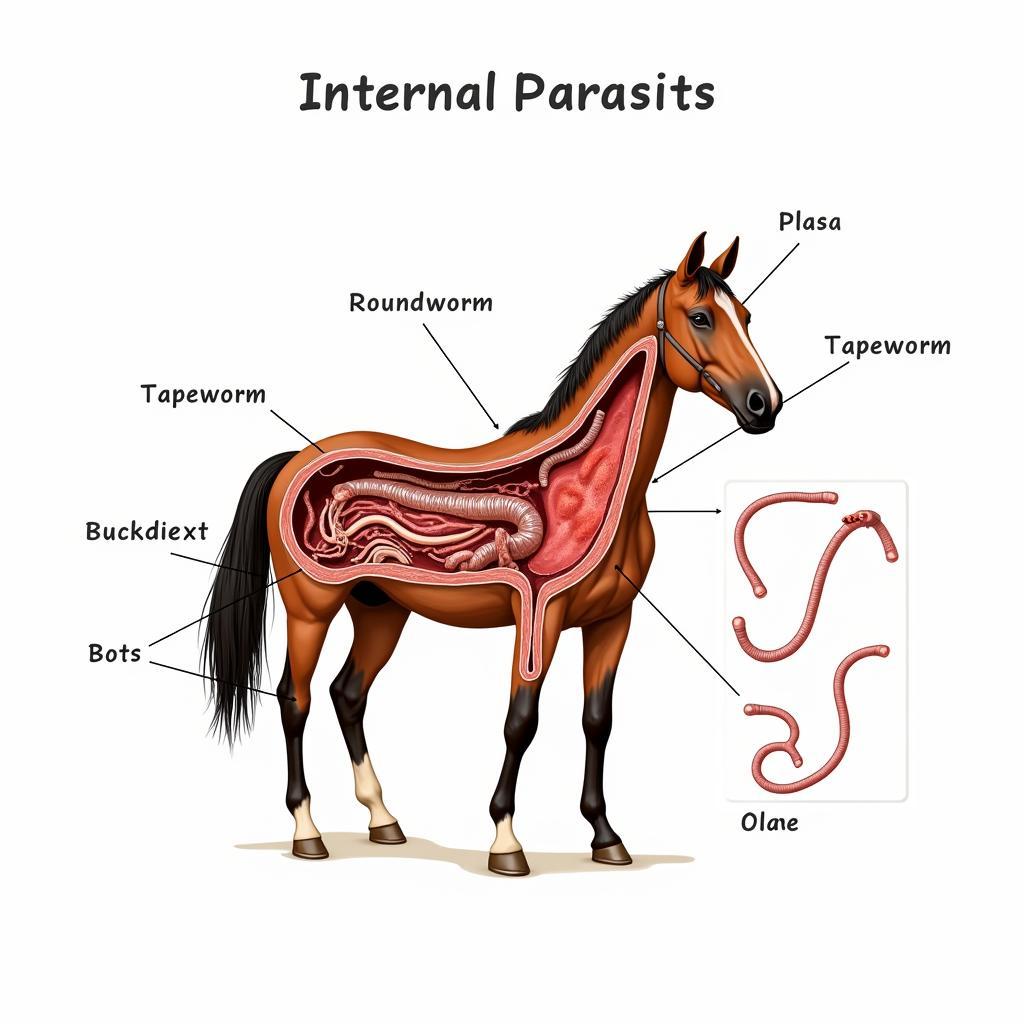When it comes to your horse’s health, parasite control is paramount. Internal parasites, if left unchecked, can wreak havoc on your equine companion’s digestive system, leading to a host of problems ranging from weight loss to colic. That’s where worming paste for horses comes in. This essential tool in your horsekeeping arsenal helps you combat these unseen invaders and keep your horse thriving.
Understanding the Enemy: Types of Internal Parasites in Horses
Before we delve into the specifics of worming paste, it’s crucial to understand the adversaries we’re up against. Horses are unfortunately susceptible to a variety of internal parasites, including:
- Roundworms: These common culprits reside in the horse’s intestines and can cause a range of issues, including stunted growth, poor coat condition, and even colic.
- Tapeworms: These flat, segmented worms attach themselves to the horse’s intestinal lining and can lead to weight loss, colic, and digestive upset.
- Bots: While technically the larvae of botflies, these parasites embed themselves in the horse’s stomach, causing irritation and potentially leading to ulcers.
 Horse Internal Parasites
Horse Internal Parasites
The Role of Worming Paste in Horse Health
Worming paste delivers a concentrated dose of medication designed to eliminate specific types of internal parasites. These pastes typically contain anthelmintics, which are active ingredients that either kill or paralyze the worms.
Different Types of Dewormers for Horses
Just like there are different types of parasites, there are different types of worming pastes designed to target specific culprits. Some common types of dewormers include:
- Pyrantel Pamoate: Effective against roundworms and some pinworms.
- Ivermectin: A broad-spectrum dewormer that targets a wide range of parasites, including roundworms, bots, lungworms, and some types of mites.
- Moxidectin: Another broad-spectrum option that is effective against a similar range of parasites as ivermectin.
- Fenbendazole: This dewormer is effective against roundworms, lungworms, and some tapeworms.
Choosing the right worming paste for your horse depends on several factors, including the suspected parasite(s), your horse’s age and health status, and your geographic location.
 Horse Getting Dewormed
Horse Getting Dewormed
Developing a Deworming Schedule for Your Horse
Gone are the days of simply deworming every few months. Modern horse owners are moving towards a more strategic approach to parasite control. Here’s a breakdown of the recommended strategies:
1. Fecal Egg Counts: This diagnostic test analyzes your horse’s manure to determine the type and number of parasite eggs present. By understanding your horse’s individual parasite load, you can tailor a deworming program that is both effective and minimizes the risk of parasite resistance.
2. Targeted Deworming: Based on the results of fecal egg counts, you can administer dewormers only when necessary and target the specific parasites present. This approach helps to preserve the effectiveness of deworming medications and reduces unnecessary exposure to chemicals.
3. Seasonal Considerations: Some parasites, like bots, have specific life cycles that align with the seasons. Your veterinarian can help you time deworming treatments to target these parasites at their most vulnerable stages.
4. Pasture Management: Parasite control goes beyond deworming. Maintaining clean pastures by rotating grazing areas, promptly removing manure, and avoiding overcrowding can significantly reduce the number of parasites your horse encounters.
Administering Worming Paste: Tips for Success
While administering worming paste might seem straightforward, here are a few tips to ensure a smooth process:
- Read the Label: Always follow the instructions on the worming paste label carefully, including the dosage guidelines based on your horse’s weight.
- Use a Syringe: Most worming pastes come in a syringe with markings for accurate dosing.
- Insert Carefully: Insert the syringe into the corner of your horse’s mouth, ensuring it goes over the tongue to prevent spitting out the paste.
- Depress the Plunger: Depress the plunger slowly and evenly to deliver the entire dose.
- Keep Head Elevated: Keep your horse’s head slightly elevated for a few seconds after administering the paste to ensure it is swallowed.
Recognizing Signs of Parasite Infestation
While regular deworming and fecal egg counts are essential for prevention, it’s crucial to be aware of potential signs of parasite infestation in your horse, including:
- Weight loss: Despite a healthy appetite.
- Dull coat: Loss of shine and a rough appearance.
- Pot belly: Especially in young horses.
- Tail rubbing: A sign of pinworm infestation.
- Lethargy: Lack of energy and enthusiasm.
- Colic: Abdominal pain, often indicated by pawing, rolling, or looking at the flanks.
If you notice any of these signs, contact your veterinarian immediately to discuss appropriate diagnostic testing and treatment options.
Worming Paste: An Essential Tool for Horse Owners
Worming paste is an indispensable tool in your horse health management toolbox. By understanding the different types of dewormers, developing a strategic deworming schedule, and staying vigilant for signs of parasite infestation, you can help ensure your equine companion lives a long, healthy, and parasite-free life.
Remember, your veterinarian is your best resource when it comes to developing a customized parasite control plan for your horse. Don’t hesitate to reach out for guidance and support.
FAQs About Worming Paste for Horses
1. How often should I deworm my horse?
The frequency of deworming depends on various factors, including your horse’s age, health, living conditions, and geographic location. It’s best to consult with your veterinarian to establish a personalized deworming schedule based on fecal egg count results.
2. Can I deworm my pregnant mare?
Some dewormers are safe for pregnant mares, while others are not. Always consult your veterinarian before deworming a pregnant mare to ensure the safety of both the mare and the foal.
3. What are the risks of not deworming my horse?
Untreated parasite infestations can lead to a range of health problems in horses, including weight loss, colic, intestinal damage, and even death in severe cases.
4. Can I buy worming paste over the counter?
Yes, many worming pastes are available over the counter at farm supply stores and online retailers. However, it’s crucial to consult with your veterinarian to determine the right type and dosage for your horse.
5. Are there any natural alternatives to worming paste?
While some horse owners explore natural deworming methods, such as herbal supplements or pasture management practices, it’s important to note that these methods may not be as effective as conventional dewormers.
Do you have other questions about worming paste for horses? Check out our other resources on pyrantel for horses, dewormer rotation for horses, strongid wormer for horses, or learn more about Strongid for horses and Power Pack wormer for horses.
For personalized advice and support, contact us today! Our team at Justus Horses USA is dedicated to providing you with the information and resources you need to keep your equine partner healthy and happy.
Need help with worming your horse? Contact us at Phone Number: 0772127271, Email: [email protected], or visit our address: QGM2+WX2, Vị Trung, Vị Thuỷ, Hậu Giang, Việt Nam. We have a 24/7 customer support team ready to assist you.